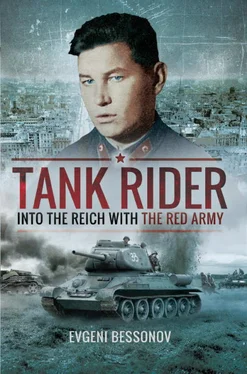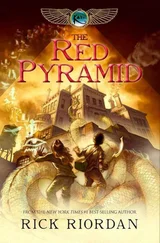The Germans, at least fifteen of them, all ran away in the direction that the truck emerged from. I am sure that some of them got hurt by the fire of my platoon, but there were no bodies. We did not pursue them – how could we find them in darkness of the night? Maybe we did wound someone, but we did not look for the escaping Germans. I forbade my soldiers to search the body of the truck, where my unexploded grenades were lying – I feared that they could go off. I climbed up the truck and inspected it myself, but did not find the grenades in the dark. I have been puzzled for a long time as to why the grenades did not explode and have not been able to come to any conclusion, but in subsequent battles I started to change grenades for the new ones more frequently and thoroughly inspected them, especially the fuses.
At midnight of 16 January, the artillery section leader reported that at least ten Tiger tanks had appeared at the forest edge in front of our defences. I ordered them to open fire on the tanks. The two guns of the battery opened fire on them, but in the darkness you could see the armour-piercing shells hitting the front armour, ricocheting and flying off into the sky with a loud ring. Our tanks also fired a few rounds and ceased fire. The tankers reported to Burkov that the tanks were not working properly and could not fire on the enemy: the first tank could not rotate its turret, while the second one also had some defects. Besides that, the second crew only had the driver and tank commander. When Burkov learnt about this, he just spat on the ground, cursed and said that the tank regiment was supposed to know what kind of tanks they were sending on such a responsible mission.
Nevertheless, our fire stopped the enemy’s tanks, but they opened intensive fire with armour-piercing and high-explosive shells on our defences. We spent an awful night at that road crossing. The enemy’s shells were exploding next to tanks and guns, but we did not have losses and even the house that we had abandoned did not catch fire. Soldiers had only been able to dig skirmisher’s trenches, which secured them from bullets, but not from artillery fire and splinters, while Burkov and I did not even have those shelters – we sat behind a tank.
Captain Burkov asked me: ‘What do you think, will we make it alive from here or Germans will crush us here?’ What could I, a 21-year-old Lieutenant, answer to this? As far as I remember, in order to calm both of us down, I said: ‘Let’s sit under the tank till dawn, it is not much time left, and we will see then! We will complete the mission. We will retreat to the hill which is behind us.’ After that we had a smoke. Officers at the front received Kazbek (Russian brand name – translator’s note) cigarettes or light tobacco in packs. I rarely smoked, but in hard situations I normally smoked mahorka (tobacco for handrolling issued to enlisted men – translator’s note) , giving my good tobacco away to those who preferred good tobacco and cigarettes.
We were just a handful of soldiers at the crossing, while the enemy concentrated both tanks and infantry against us. Of course, we could not put up stubborn resistance. But the tanks did not attack us, and we with Mochalov’s machine-guns were able to throw attacking German infantry back all night long. Germans, as a rule, would not attack during the night, they only attacked at dawn or in daytime, so I thought (and I shared this with Burkov), that the Germans would attack en masse at dawn. Apparently, the enemy simply did not yet know what forces he was facing, it was impossible to see at nighttime, but with the coming of dawn the Germans would attack with all their strength. They had to capture the road crossing in order to retreat to the west and avoid destruction by other Red Army units. Our infantry was not a problem for German tanks, 76 mm guns were also too weak, while our two broken-down tanks could not fire and would be knocked out right away by the Tigers.
Before morning Captain Burkov made a decision to withdraw to the hill which was behind us, behind the road. ‘Let’s say good bye to each other: apparently the Germans will not let us leave this road crossing alive. The dawn will come and Fritzes’ tanks will crush us.’ This he said to me. Before it grew lighter we withdrew our artillery and then ourselves went to the hill, following our guns. Having completed this manoeuvre, we wanted to dig in at the hill, but the soil there was also too hard, and we just lay down on the ground. It was growing light, and we had to watch out. Our two tanks also arrived – they safely hid behind the hill, as the reverse slope of the hill was steeper than the one facing the Germans.
At dawn the Germans started their attacks on the hill. At least ten German tanks impudently attacked our positions. Yes, things looked bad for us. A line of attacking German infantry was walking across the field on our left flank, on our right flank there was also a battle – we could hear machine-gun bursts and gunfire. It was hard to understand what was going on over there. The Germans destroyed one of our tanks, the one that could not rotate the turret, on that hill. The second tank was firing on the Tigers and even made them stop half way up the slope. The battle intensified. We thought that reinforcements had arrived, but everything was mixed up and we could not tell where the enemy and where the friendly troops were. Then Burkov ordered us to withdraw the artillery into the forest, while we stayed on the hill, which did not have any place to hide in. Then he gave us an order to retreat as well. It was only later that I understood that Burkov ordered us to retreat to the forest in order to save soldiers’ lives, to save them for future battles… Before we reached the forest edge, Burkov was heavily wounded – he was standing on the step of a truck, and was hurt when the driver accidentally passed too close to a tree. We laid him on a rain cape and carried him along forest edge toward Bobzha village, from which Kozienko sent me to the road crossing and ordered to hold it till dawn. I fulfilled the order – it was already morning.
Of course we could stay at the road crossing, but we could no longer contain the enemy – the Germans needed ways of retreat, and they would have merely squashed us with tanks, as we could not dig proper trenches. Nevertheless, we fulfilled the order of the battalion commander and held the positions almost till noon withdrawing only on Burkov’s order. It was hard to carry Maxim Tarasovich: the soldiers had to take turns very often. Soldiers drew my attention to footprints of Germans jackboots on the snow – the soles of their jackboots were covered with large nails. The footprints went deep into the forest. We sent out a squad to find a further road to Bobzha and followed the squad at some distance, but did not encounter any Germans. Then we reached the well-rolled road that went to that village and curved to the right along forest edge. We were planning to check who was in the village, when a truck appeared on the road. The driver of the truck was an officer whom I knew. He told us that the village was occupied by our forces – the 2nd and the 3rd battalions of the Brigade, while behind a hill, in another village he had seen 1st battalion commander Kozienko.
I asked him to drive Burkov to the medical platoon, as the driver knew Burkov as well. We put Burkov into the back of the truck, and I sent some soldiers as escort, and the truck left, while Lieutenant Mochalov, the machine-gun platoon leader and I went on to the battalion with our men. The soldiers, as well as Vasily Mochalov and I, were happy to have survived that hellish merry-go-round. We were walking on the road in a crowd, laughing and making jokes with each other. I lost my feeling of alertness, which happened to me quite rarely; if there had been an ambush, they would have slaughtered us all in no time. Several soldiers even drove on abandoned German motorcycles without fuel – they rolled down the hill very well even without the engine working.
Читать дальше












